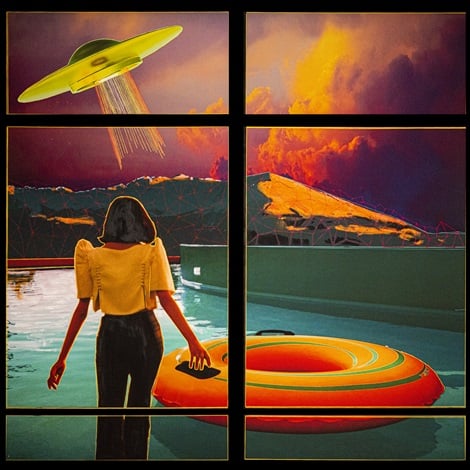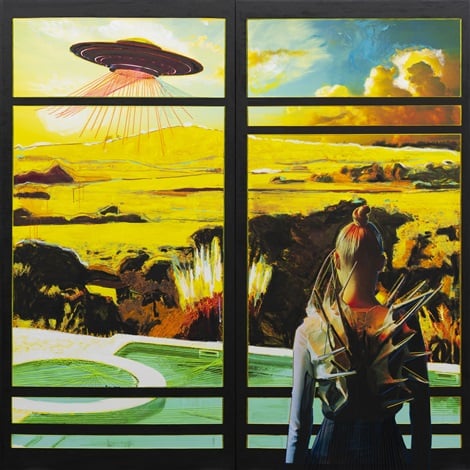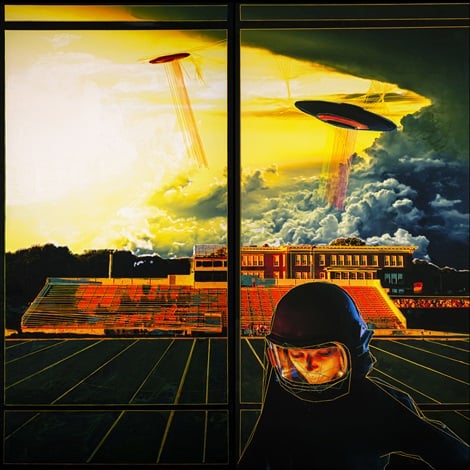Gallery Network
7 Questions for Chinese Artist Lin Jingjing About Why She Filled Her New Apocalyptic Series of Paintings With UFOs
The artist's apocalyptic new paintings are now on view at Hong Kong's De Sarthe Gallery.

The artist's apocalyptic new paintings are now on view at Hong Kong's De Sarthe Gallery.

Artnet Gallery Network

During the pandemic, Beijing- and New York-based artist Lin Jingjing found herself, like the rest of us, spending most hours of the day on her phone and computer. During this unusual time, she began a new series of multimedia paintings that show men and women gazing out windows as U.F.O.s make contact with Earth.
The peculiar paintings vacillate between the dystopian and utopian (are these aliens here to destroy us or save us? she seems to ask). The figures Jingjing inserts into these strange tableaux at once call to mind jet-setting influencers (who we saw still managed to post throughout the pandemic) and the explorers shown in German Romantic paintings, such as Caspar David Friedrich’s Wanderer above the Sea of Fog. Jingjing’s works were recently on view in “Elsewhere” at Hong Kong’s De Sarthe Gallery.
We spoke with the artist about the series and what she thinks the function of artists is in a technology-saturated society.

Lin Jingjing, Constantly, Consistently (2022). Courtesy of De Sarthe Gallery.
Can you tell me about the inspirations behind this exhibition? From when do these works date?
This series wasn’t planned, but the pandemic forced me to stop and think about the situation we were living in. I was in Beijing when the pandemic broke out and we were wondering what would happen if the virus came to the U.S.—for example, to New York, but we didn’t expect anything to happen so quickly or to last so long. This new series of works emerged from the past two and a half years of thinking about world society.
Before the pandemic, I had been working on a series that was A.I.-related, asking where our society is heading with all this technology, whether people wanted real friends anymore or if A.I. was good enough. The real world itself can feel very unreal, like a digital world. At the same time, we were all dealing with this pandemic and living our lives online. That became our real life. It’s a kind of paradox.
U.F.O.s occupy the backgrounds of these paintings. Can you tell me about them?
The U.F.O. that I use in each of the works are about this tension. U.F.O.s confuse us–are they coming to save us and take us somewhere else, or are they here to destroy us? It’s a mixed-up feeling.
All the paintings feature a kind of window where the figures that appear in the paintings seem to be looking out. Can you tell me about that decision?
These technologies act much like a window. It seems like they can save us, can open up and free us, but are these really the windows we want? That’s what I’m trying to do with these paintings. The world beyond the window looks very dramatic and colorful and the U.F.O.s almost look inviting. But at the same time, we don’t really know what to expect. The series is called “Elsewhere” because that’s the feeling people have right now—they are traveling like crazy because they just don’t want to be in their homes anymore, they want to be somewhere else. People almost don’t care where they are as long as it’s not here.

Lin Jingjing, Everything Happened Here Happened Long Ago (2022). Courtesy of De Sarthe Gallery.
What are your major concerns about technology?
What worries me is that there is no way to U-turn. If we replace our old systems and later decide they were better, there is no going back. I wonder if we are going to miss something we didn’t even know we had and we’re going to have to live with our mistakes.
Can you tell us a bit about the materials used to create these works?
I edit a photo image until it’s the way I want it and then I print it onto the canvas. Then I paint on it and after that, I add stitching. I actually physically stitch onto the canvas, which is a way of colorizing the image and making it more dramatic, with rays of sunshine or whatever. Materially I think stitching echoes the paradoxical nature of the images. Stitching can be used to repair something but at the same time, each stitch creates new holes. It’s a material I’ve been using for many years.
What do you think the role of art is in our society right now?
I think about this a lot, actually. I’m trying to offer a different perspective and also share all my thinking. At the beginning of 2020, as an artist suddenly all our shows were canceled. In these types of situations, like a pandemic, what role can an artist play? Are we just useless? Doctors and nurses are trying to save people’s lives, but what can artists do? I think we can offer a change of perspective. With technology today it’s like we’re stuck in a computer game, stuck on receiving information. When you’re receiving that much information you lose the ability to think. Independent thinking becomes unusual. So I think this is important that I make work that mines into ideas and get people to think about the ways we are living.
What’s your own relationship with technology?
I’m living in this world just like everybody else. I’m living online, too. I haven’t managed to escape it. I rely on it so much—sometimes I feel like too much. Even as I’m making the work, I’m questioning myself. Everything I read in the news I try to think about just a little bit more. It’s not just my issue or somebody else’s issue, it’s everybody’s issue and I’m just trying to understand what is happening next, to slow things down for a moment.
Discover works by Lin Jingjing in “Elsewhere” with De Sarthe Gallery.